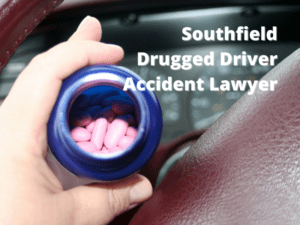
When people use drugs and drive, they put themselves, their passengers, and other road users at risk of suffering severe or deadly injuries. According to data from the National Highway Traffic Safety Administration (NHTSA), 56 percent of U.S. drivers involved in serious injury or fatal crashes in late 2020 tested positive for one or more drugs.
If you were involved in a Southfield car accident with a drugged driver, you know how dangerous drugged driving can be. You may be dealing with painful injuries, missing time at work, and wondering how to manage a growing pile of medical bills.
Reach out to a drugged driving accident attorney at Christensen Law today. Our award-winning Michigan injury lawyers help injured people seek justice and fair compensation for their losses from offices throughout the state, including Southfield. Contact us today to learn more in a free initial consultation.
What Is Drugged Driving?
Drugged driving occurs when someone operates a motor vehicle while under the influence of any type of intoxicating drug or a combination of drugs. Just like alcohol, many over-the-counter (OTC) drugs, prescription medications, and illegal drugs have mental and physical effects that can dangerously impair safe driving abilities.
Marijuana, cocaine, opiates, and many other drugs have a wide range of effects that vary considerably based on factors like dosage, the route of administration, and interactions with other substances. Individual differences also make it difficult to predict how certain drugs will affect people, especially when they mix drugs or consume alcohol with other substances.
It doesn’t take a massive dose of drugs to intoxicate a driver. For this reason, Michigan and many other states have zero-tolerance laws that prohibit driving while under the influence of any controlled substances.
Michigan Drugged Driving Laws

- They are intoxicated or impaired by a controlled substance or any other intoxicating substance.
- They have any amount of marijuana in their systems.
- They have any amount of cocaine or any other Schedule 1 controlled substances in their bodies. Common Schedule 1 drugs include heroin, LSD, and MDMA.
Michigan’s anti-drugged driving laws impose the following penalties for offenders:
- A mandatory six-month license suspension for any drugged driving conviction, even for first-time offenders. Some drivers are eligible for restricted driving permissions after 30 days of full suspension. Drivers with multiple convictions may face harsher sanctions, such as license revocation or denial.
- Court-ordered participation in a rehabilitation or self-help program if the driver has any prior drugged or drunk driving convictions.
- Five days to one year of jail time, 30 to 90 days of community service, or both, for second-time drugged or drunk driving offenders.
- Felony charges for drivers with three or more drugged driving convictions and drugged driving convictions related to accidents that resulted in serious injury or death.
Can Any Medication Affect Driving Ability?
Not all medications affect your ability to drive. But to be safe, it’s best to avoid driving after you start any new drugs to determine whether you experience unsafe side effects.
Examples of drug-induced side effects that could lead to drugged driving accidents include:
- Drowsiness or fainting
- Dizziness or nausea
- Blurred vision
- Difficulty focusing
- Excitability
- Difficulty paying attention
- Slowed reaction time
- Sleepiness
Common medications that could render you unsafe to drive include:
- Opioid pain relievers such as OxyContin, Vicodin, and codeine
- Muscle relaxants and other central nervous system depressants
- Certain antidepressants and antianxiety drugs, such as Xanax
- Anti-seizure, anti-epileptic, and antipsychotic drugs
- Some cold medicines and products that contain codeine
- Prescription and OTC allergy products and antihistamines
- Sleeping pills, some of which can impair users until the following morning
- Diet pills, caffeine pills, and other stimulant drugs intended to keep users awake
- Anti-nausea or anti-diarrheal medications
Can You Sue a Drugged Driver?
Michigan is a no-fault car insurance state. Motorists must first file car accident claims for certain losses like medical expenses and lost wages with their insurance providers for compensation, no matter who was at fault. However, if you were seriously injured in a Michigan drugged driver accident, you may have the right to sue the at-fault driver under certain circumstances.
For example, you may have grounds for legal action if your no-fault policy is limited and your accident-related medical expenses or wage losses exceed the policy’s coverage limits. If this occurs, you could sue the drugged driver for your excess medical expenses and wage-loss benefits. You may also have the right to sue for the subjective costs of your accident-related pain and suffering, but only if you can demonstrate that you suffered a serious impairment of body function.
If your vehicle was damaged in the wreck and the drugged driver was insured, you could file a mini-tort lawsuit against them for up to $3,000 of your repair costs. If the drugged driver was not insured, you have the right to sue them for the total cost of your repairs.
Damages in a Drugged Driving Accident Lawsuit
The term “damages” refers to the amount of money you could recover for your losses after an accident. If you file a personal injury or property damage lawsuit, you could receive compensation for:
- Medical bills: Excess medical expenses from accident-related injuries, such as ambulance rides, hospital stays, doctors’ visits, and prescription medications.
- Vehicle repair costs: You could recover up to $3,000 in vehicle repair expenses or the full amount of your repair expenses if the other driver was uninsured.
- Lost wages: Additional lost wages if you are forced to miss any time at work while you recover from your accident-related injuries.
- Pain and suffering: The intangible costs of your accident-related pain and suffering if you suffer a serious injury, as defined by Michigan law.
Contact a Trusted Southfield Drugged Driving Accident Attorney
It can be challenging to demonstrate fault and obtain maximum compensation after a drugged driving accident in Southfield. You need a knowledgeable attorney who is deeply familiar with Michigan law and the civil court system to give you the best shot of recovering what you deserve. You need the drugged driving accident lawyers at Christensen Law.
Don’t hesitate to discuss the details of your accident claim with us. Call or contact us today for a free consultation.





